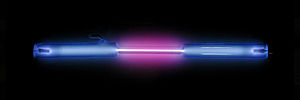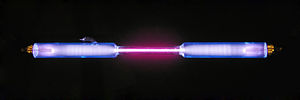Hydrogen
| It matters Chemistry |
| Action and reaction |
| Elementary! |
| Spooky scary chemicals |
| Er, who's got the pox? |
Hydrogen (H) is an element comprising 1 proton and 1 electron per atom. It is the only chemical element that normally doesn't have any neutrons in its atoms.
At earth's surface conditions, hydrogen forms a diatomic gas (H2), which is colorless and odorless, but highly flammable.
Hydrogen reacts violently with oxygen to form water (H2O), liberating a great deal of chemical energy in the process. The Hindenburg disaster was caused by an ignition source sparking this chemical reaction.
Hydrogen nuclei at high enough temperatures and pressures react even more violently to form helium nuclei, liberating a very great deal of nuclear energy in the process. See the sun (but not with unprotected eyes) for an example of this.
Isotopes[edit]
Almost all hydrogen in the universe is the normal (hydrogen-1) isotope, with no neutrons in its nucleus. Because the nucleus of hydrogen-1 consists entirely of a single proton, it is sometimes called "protium".
There are two other hydrogen isotopes: deuterium, which contains 1 neutron, and tritium, which contains 2 neutrons. Normal hydrogen (protium) and deuterium are stable, while tritium is radioactive. Water made with deuterium atoms instead of hydrogen-1 atoms is called "heavy water",[note 1] and is used in some nuclear reactor designs. Interestingly, and for reasons that are not fully understood, heavy water differs greatly in many of its properties from "light water", the 'normal' form of water, to the point of being significantly, albeit slightly, toxic to all but the simplest organisms.
Both deuterium and tritium are of interest to researchers in nuclear fusion, since the reaction cross-sections of their nuclei are so high. This is also why they're used in nearly all modern nuclear weapon designs. Some manufacturers of guns and related products, such as Trijicon, make use of tritium in their products for the glow emitted by its decay.
See also[edit]
Notes[edit]
- ↑ Not to be confused with "heavy oxygen water".

